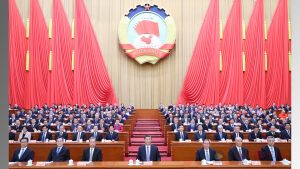
China’s Property Slump Raises Concerns of Long-Term Economic Ripple Effects: Analysts
Beijing, Nov 17: With a sharp decline in property sales and a significant drop in real estate investments during October, analysts express growing concerns that the repercussions of China’s real estate crisis may extend to other sectors of the economy in the long run.
Despite recent measures taken by Beijing to address the situation, analysts predict that the spillover effects will persist in the “foreseeable future.”
Moody’s, in a client note on Nov. 14, stated, “The prolonged property market downturn is resulting in adverse spillover effects to other non-financial corporate sectors through direct and indirect channels, while most sectors will face the effects for the foreseeable future.”
The initial impact will manifest directly through reduced economic activity, including the property-related supply chain. Subsequently, an indirect effect will follow, creating a feedback loop of a weakened macroeconomic environment, diminished consumer and investment sentiment, lower borrowing propensity, and increased risk aversion.
Recent data from the National Bureau of Statistics revealed a fourth consecutive monthly decline in new home prices across China in October, with numerous cities experiencing significant downturns. This signals a broader weakening in the sector, posing potential obstacles to the country’s overall recovery.
The median price of new homes in 70 major cities dropped by 0.4 percent in October, marking the most substantial downturn since the peak of the COVID-19 pandemic in 2022. Despite Beijing’s efforts, real estate investment plummeted by 9.3 percent during the first 10 months of the year, worsening from the 9.1 percent decline recorded in the first nine months.
Analysts from Nomura estimate that approximately 20 million units of unconstructed and delayed pre-sold homes pose a significant obstacle to real estate revival, representing a potential funding gap of around ¥3.2 trillion. This issue could escalate into a social problem, potentially endangering social stability.
While the prolonged property downturn primarily affects sectors related to the supply chain, such as building materials and construction machinery, it also has significant adverse effects on regional and local government finances and local government financing vehicles (LGFVs), according to Moody’s. The risks extend across the economy, impacting various sectors.
Chinese banks and financial institutions, given their large exposure to the property sector, face considerable risks, including the potential increase in non-performing assets. The property crisis, a long-term issue, presents challenges for policymakers managing deleveraging, limiting financial systemic risk, and supporting economic growth amid a slowing housing market. Authorities’ reduced willingness to support the sector may prolong the property downturn, increasing uncertainty for developers and property buyers.
In the first round of the downturn, industries directly supplying products or services to the property development sector, such as steel, chemical, transportation, home appliances, natural gas delivery, and auto rentals, are most affected. The second wave is expected to impact non-financial corporate sectors not directly linked to the property sector but vulnerable to changes in funding conditions or market confidence, including automobile manufacturers, oil and gas companies, mining, retail, transportation, and logistics.
Analysts agree that China’s property crisis poses long-term challenges, hindering economic growth for years to come. Policymakers face difficulties balancing deleveraging efforts, limiting systemic risks, and sustaining economic growth amid a sluggish housing market. The property downturn’s duration may be prolonged due to reduced policy support, heightening risks for developers and property buyers.















Comments